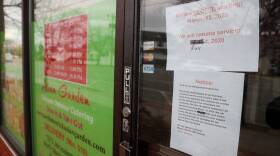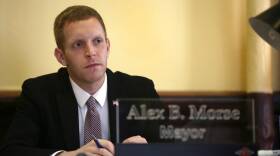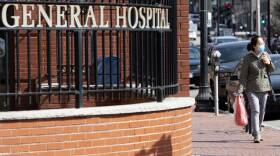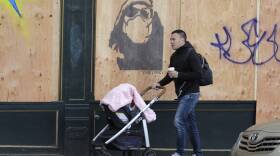EXPLORE MORE
Coming up Monday on BPR:
Former Boston Globe editor – now head of BU Journalism – Brian McGrory
GroundTruth Project’s Charlie Sennott
NPR TV critic Eric Deggans
Reverends Irene Monroe and Emmett Price
Recent segments
-
Corby Kummer: The Restaurateur Dilemma During Coronavirus
Legal liability will be better for restaurants that close down, Kummer said, but many are trying to stay open. -
Village Voice: Poems For Social Distancing
"When things are really bad, poets always find the good thing," said Richard Blanco. -
Alex Beam's New Book Reveals The Rocky History Behind The Farnsworth House
In "Broken Glass: Mies Van Der Rohe, Edith Farnsworth, and the Fight Over a Modernist Masterpiece,” Beam explores the relationship between architect and client. -
Holyoke Mayor Morse Discusses Deaths At Veterans Center
Following an outbreak of COVID-19 at The Soldiers’ Home, a veterans center in Holyoke, at least fifteen individuals have been confirmed as dead. At least six of the dead tested positive for COVID-19 while six others are awaiting test results. -
Dr. Gary Gottlieb Pitches His Plan For Massachusetts Healthcare In The COVID-19 Fight
The former Partners in Health CEO called for the rapid expansion of the state's Mobile Integrated Health program. -
Chuck Todd: Social Distancing Works, The Challenge Is To Keep Doing It Even When The Curve Starts To Flatten
Strict social distancing is working, but we shouldn't relax restrictions yet.
Listen to previous shows
-

BPR Full Show: Atonement
Today on Boston Public Radio: EJ Dionne discusses the voting rights measure and infrastructure spending package as the Senate returns from their August recess this week. He also weighs in on whether or not Supreme Court Justice Stephen Breyer should retire. Dionne is a columnist for The Washington Post and a senior fellow at The Brookings Institution. His latest book is "Code Red: How Progressives And Moderates Can Unite To Save Our Country.” Then, we talk with listeners about their opinions on masking indoors as the Delta variant continues to spread. Yawu Miller gives listeners a primer on tomorrow’s Boston Mayoral primary, a historic race for its racial diversity and female-majority among major candidates. He also discusses current polling data and voter patterns along demographic lines. Miller is a Senior Editor of The Bay State Banner. Bruce Marks talks about what the Supreme Court’s end to the eviction moratorium means for Massachusetts, and what his organization, the Neighborhood Assistance Corporation of America (NACA) is doing to help. Marks is the CEO and founder of NACA, the nation’s largest Housing and Urban Development-certified nonprofit. Revs. Irene Monroe and Emmett G. Price III speak out against the Islamophobia in the United States that has persisted following 9/11. In the days before Yom Kippur, the Jewish Day of Atonement, they also argue about what forgiveness means. Monroe is a syndicated religion columnist, the Boston voice for Detour’s African American Heritage Trail, and a visiting researcher in the Religion and Conflict Transformation Program at the Boston University School of Theology. Price is the founding pastor of Community of Love Christian Fellowship in Allston. Together, they host GBH’s All Rev’d Up podcast. Richard Blanco gives a poet’s take on poetry, reading famous quotes and weighing in on the purpose and impact of the art form. Blanco is the fifth inaugural poet in U.S. history. His new book, "How To Love A Country," deals with various socio-political issues that shadow America. In the days leading up to Yom Kippur, we end the show by asking listeners what atonement and forgiveness should look like in a deeply divided country. -

BPR Full Show: On Camera
Today on Boston Public Radio: Charlie Sennott tells the story of the Goodrich family, who lost their son in the 9/11 and went on to build a girls school in Afghanistan, which has since been taken over by the Taliban. Sennott is a GBH News analyst and the founder and CEO of The GroundTruth Project. Art Caplan weighs in on President Joe Biden’s latest plan to fight COVID-19, which involves a federal rule requiring vaccines or weekly testing for all businesses with 100 or more employees. Caplan is the Drs. William F. and Virginia Connolly Mitty Professor and founding head of the Division of Medical Ethics at NYU School of Medicine in New York City. Then, we talk with listeners about their impressions of Biden’s new vaccine mandate. Andrea Cabral talks about a lawsuit filed Thursday by the Justice Department against the state of Texas, aiming to invalidate the new abortion restrictions. She also weighs in on Supreme Court Justice Stephen Breyer’s insistence that he will not retire. Cabral is the former Suffolk County sheriff and the former Massachusetts secretary of public safety. She is currently the CEO of the cannabis company Ascend. Juliette Kayyem discusses the impact of COVID-19 and climate change-induced natural disasters on the Federal Emergency Management Agency, or FEMA. Kayyem is an analyst for CNN, former assistant secretary at the Department of Homeland Security and faculty chair of the homeland security program at Harvard University’s Kennedy School of Government. Sue O’Connell weighs in on this week’s Boston Mayoral debates and their potential effect on the race. She also talks about the recent loss of Michael K. Williams, who played Omar on “The Wire.” O’Connell is the co-publisher of Bay Windows and the South End News, as well as NECN's political commentator and explainer-in-chief. Andy Ihnatko talks about new developments in surveillance technology, including front door cameras and Ray Bans that record video straight to Facebook. He also discusses decisions by GoDaddy.com and Reddit to shut down threads aiming to bring lawsuits against people getting abortions in the wake of the recent Texas law. Ihnatko is a tech writer and blogger, posting at Ihnatko.com. Then, we talk with listeners about their thoughts on the Ray Bans sunglasses with recording capacity. -

BPR Full Show: Back to School
Today on Boston Public Radio: First, we talk with listeners about the school bus driver shortage on back to school day. Denise Dilanni previews the new series from GBH, “The Future of Work,” about the current transformation of the American workforce brought by automation, the gig economy and COVID-19. The show airs on GBH2 on Sept. 15, the PBS Video app and the PBS Voices YouTube Channel. Dilanni is an executive producer at GBH and the series’ creator. Ambassador Philippe Etienne talks about the effect of the Sept. 11 terrorist attacks on Europe, and the impact of our nation’s withdrawal from Afghanistan on European peace efforts in the mid-east country. He also talks about America’s relationship with France under President Joe Biden, and the success of his country’s vaccine “health pass” system. Etienne is the French ambassador to the United States. Paul Reville discusses the return of Mass. students to classrooms amid the Delta variant and fights over mask mandates, vaccines and school bus shortages. Reville is the former Massachusetts secretary of education and a professor at Harvard University’s Graduate School of Education, where he also heads the Education Redesign Lab. His latest book, co-authored with Lynne Sacks, is “Collaborative Action for Equity and Opportunity: A Practical Guide for School and Community Leaders.” Then, we continue our conversation with listeners about going back to school during the pandemic. Jon Gruber talks about the connection between a lack of abortion rights and worse lifetime outcomes, in the wake of the new Texas law. Gruber teaches economics at MIT. He was instrumental in creating both the Massachusetts health-care reform and the Affordable Care Act, and his latest book is "Jump-Starting America: How Breakthrough Science Can Revive Economic Growth And The American Dream." In light of Boston Globe business columnist Shirley Leung's recent piece about the plight of hotel workers, we open phone lines to ask listeners their thoughts on hotel companies recommending guests forgo daily room cleanings at the expense of staff. -

BPR Full Show: Spare Change
Today on Boston Public Radio: Art Caplan talks about the Supreme Court’s upholding of the new Texas abortion law and an Ohio judge protecting hospital patients from the latest controversial and off-label COVID-19 treatment — the anti-parasitic drug ivermectin. He also weighs in on conflicting attitudes surrounding vaccine booster shots. Caplan is the Drs. William F. and Virginia Connolly Mitty Professor and founding head of the Division of Medical Ethics at NYU School of Medicine in New York City. Then, we hear listeners’ opinions on boycotting business that have not spoken out against the new Texas abortion law. Andrew Bacevich weighs in on who should take responsibility for the crisis in Afghanistan, the United States’ standing in the world 20 years after 9/11 and what service to the country should look like. Bacevich is the President of the Quincy Institute for Responsible Statecraft, a Professor Emeritus of International Relations and History at Boston University and author of "The Age of Illusions: How America Squandered Its Cold War Victory.” State Rep. Mike Connolly discusses his bill looking into reversing the state’s Happy Hour ban, which he hopes could help restaurants bounce back from COVID-19. Connolly represents the Massachusetts House of Representatives’ 26th Middlesex district, which comprises East Cambridge and East Somerville. Laura Sullivan shares insights from her reporting on the Red Cross’ work in Haiti, and how the organization only built six homes in the country after raising half a billion dollars following the 2010 earthquake. She also talks about how to best support people in Haiti by donating to local organizations. Sullivan is an investigative correspondent for NPR who reported extensively on the Red Cross in 2015. Shirley Leung gives an update on the latest business headlines, including business leaders’ opinions on the mayor’s race, and a 50 million dollar donation from the Manning family to the UMass system. She also discusses how requesting housekeeping at hotels can keep staff employed. Leung is a business columnist for The Boston Globe and a GBH contributor. Then, we talk with listeners about the current coin shortage and the challenges of parking and paying for laundry. -

BPR Full Show: The Perilous Hot Dog Safari
Today on Boston Public Radio: We kick things off by opening phone lines to talk with listeners about the state of the pandemic moving into fall of 2021. Trenni Kusnierek discusses the latest news on COVID-19 in the world of sports, including a recent outbreak within the Boston Red Sox. She also touches on news of tennis champion Naomi Osaka’s indefinite exit from the sport. Kusnierek is an anchor and reporter for NBC Sports Boston, and a Boston Public Radio contributor. Carol Rose weighs in on the broader, grim constitutional implications of Texas’ new abortion law. She also discusses the Supreme Court’s decision not to intervene. Rose is the Executive Director of the ACLU of Massachusetts. Michael Curry talks about COVID-19 in the Commonwealth, and whether state leaders are doing enough to get residents vaccinated and quell the spread of the Delta variant. Curry is the president and CEO of the Massachusetts League of Community Health Centers and a member of Governor Charlie Baker’s COVID Vaccine Advisory Group. He’s also a Member of the National NAACP Board of Directors, and chair of the board’s Advocacy & Policy Committee. Michael Kirk discusses the legacy of the Sept. 11 terrorist attacks and America's response ahead of the 20-year anniversary, in a conversation sparked by his new FRONTLINE documentary, “America After 9/11.” John King calls in for his weekly round-up of national headlines, with a focus on President Biden’s comments about climate change infrastructure and the state of his $3.5 trillion ‘human infrastructure’ bill in Congress. King is CNN's Chief National Correspondent and anchor of "Inside Politics,” which airs weekdays and Sunday mornings at 8 a.m. We close out Tuesday’s show by talking with listeners about new research into how the foods we eat impact our lifespan.








